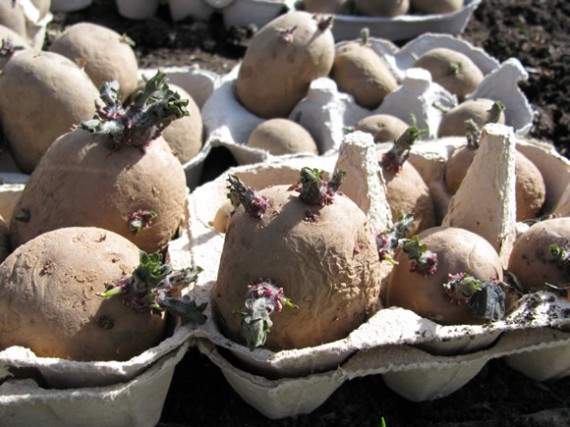Seed Potatoes
Potatoes can be affected by a number of diseases and viruses – it pays to buy seed potatoes from a reliable source that will certify them as disease free. Retaining your own potatoes for seed isn’t a good idea.
Seed potatoes grown organically will have Soil Association certification. Seed catalogues will generally say how many tubers are in a bag, as this will vary according to variety.
Seed companies will dispatch seed potatoes from about December until April / May. Once the seed potatoes arrive, open them up, inspect them, then store in cool, frost free and dark conditions until you are ready to plant them out or chit them.
You can find a list of reputable suppliers on TAS.
Chitting potatoes
Chitting means bringing the seed potatoes out into the light, so that they start to sprout. The idea behind this is that it gives the potatoes a good start so you want to have two chunky sprouts about 25mm long at planting. There is some debate over whether this actually makes a huge difference to the final crop, but chitting early potatoes probably helps them to mature earlier.
Chit potatoes in a frost free, light and well ventilated area; egg cartons are useful containers and are easily marked with the name of the variety.
 Chitting potatoes in egg boxes.
Chitting potatoes in egg boxes.
If you look closely at the seed potato, you will be able to see the rose, which is where the “eyes” are; chit with the rose uppermost. The sprouts that grow are the new foliage. Before planting, reduce the number of sprouts to the two strongest.
If the sprouts are growing white and spindly, it means the temperature is too high and there is not enough light. If shoots are slow to appear, move the seed potatoes to a warmer spot three weeks before the planned planting and move them back to your cool spot a week before planting.
Planting
Planting can start in February in containers or in the ground, if it is workable, but most outdoor planting will start in March. If you plant too early and the ground is too cold and wet, the tubers may rot. Don’t plant soft or diseased seed potatoes.
- Previous « Potato varieties
- Next Soil for potatoes »

About Rosemary Champion
Rosemary lives on a 12 acre smallholding in Angus, in the east of Scotland, where she keeps Ryeland Sheep, Shetland cattle and assorted poultry. She was destined to be a smallholder from an early age.
Further Reading
 Vegetable Growing Month-by-month John Harrison |  Kitchen Garden Estate: Self-sufficiency Inspired by Country Estates of the Past Helene Gammack |  Fruit and Vegetables for Scotland: A Practical Guide and History Kenneth Cox and Caroline Beaton |  The Vegetable and Herb Expert Dr D G Hessayon |  Comfrey: Past, Present and Future Lawrence D. Hills |

















